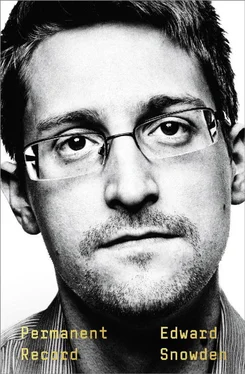6.29.2013
Been packing the house for days now with only minor interruptions from the FBI, coming by with more forms to sign. It’s torture, going through everything. Finding all these little things that remind me of him. I’m like a crazy woman, cleaning up, and then just gazing at his side of the bed. More often, though, I find what’s missing. What the FBI took. Technology, yes, but also books. What they left behind were footprints, scuff marks on the walls, and dust.
6.30.2013
Waipahu yard sale. Three men responded to Sandra’s “take it all, best offer” Craigslisting. They showed up to rummage through Ed’s life, his piano, guitar, and weight set. Anything I couldn’t bear to live with or afford to ship to the mainland. The men filled their pickup with as much as they could, and then came back for a second load. To my surprise, and I think to Sandra’s, too, I wasn’t too bothered by their scavenging. But the moment they were gone, the second time, I lost it.
7.2.2013
Everything got shipped today, except the futons and couch, which I’m just ditching. All that was left of Ed’s stuff after the FBI raided the house fit into one small cardboard box. Some photos and his clothes, lots of mismatched socks. Nothing that could be used as evidence in court, just evidence of our life together. Sandra brought some lighter fluid and brought the metal trash can back around to the lanai. I dumped all of Ed’s stuff, the photos and clothes, inside, and lit a book of matches on fire and tossed it in. Sandra and I sat around while it burned and the smoke rose into the sky. The glow and the smoke reminded me of the trip I took with Wendy to Kilauea, the volcano on the Big Island. That was just over a month ago, but it feels like years in the past. How could we have known that our own lives were about to erupt? That Volcano Ed was going to destroy everything? But I remember the guide at Kilauea saying that volcanoes are only destructive in the short term. In the long term, they move the world. They create islands, cool the planet, and enrich the soil. Their lava flows uncontrolled and then cools and hardens. The ash they shoot into the air sprinkles down as minerals, which fertilize the earth and make new life grow.
If at any point during your journey through this book you paused for a moment over a term you wanted to clarify or investigate further and typed it into a search engine—and if that term happened to be in some way suspicious, a term like XKEYSCORE, for example—then congrats: you’re in the system, a victim of your own curiosity.
But even if you didn’t search for anything online, it wouldn’t take much for an interested government to find out that you’ve been reading this book. At the very least, it wouldn’t take much to find out that you have it, whether you downloaded it illegally or bought a hard copy online or purchased it at a brick-and-mortar store with a credit card.
All you wanted to do was to read—to take part in that most intensely intimate human act, the joining of minds through language. But that was more than enough. Your natural desire to connect with the world was all the world needed to connect your living, breathing self to a series of globally unique identifiers, such as your email, your phone, and the IP address of your computer. By creating a world-spanning system that tracked these identifiers across every available channel of electronic communications, the American Intelligence Community gave itself the power to record and store for perpetuity the data of your life.
And that was only the beginning. Because once America’s spy agencies had proven to themselves that it was possible to passively collect all of your communications, they started actively tampering with them, too. By poisoning the messages that were headed your way with snippets of attack code, or “exploits,” they developed the ability to gain possession of more than just your words. Now they were capable of winning total control of your whole device, including its camera and microphone. Which means that if you’re reading this now—this sentence—on any sort of modern machine, like a smartphone or tablet, they can follow along and read you. They can tell how quickly or slowly you turn the pages and whether you read the chapters consecutively or skip around. And they’ll gladly endure looking up your nostrils and watching you move your lips as you read, so long as it gets them the data they want and lets them positively identify you.
This is the result of two decades of unchecked innovation—the final product of a political and professional class that dreams itself your master. No matter the place, no matter the time, and no matter what you do, your life has now become an open book.
* * *
IF MASS SURVEILLANCE was, by definition, a constant presence in daily life, then I wanted the dangers it posed, and the damage it had already done, to be a constant presence too. Through my disclosures to the press, I wanted to make this system known, its existence a fact that my country, and the world, could not ignore.In the years since 2013, awareness has grown, both in scope and subtlety. But in this social media age, we have always to remind ourselves: awareness alone is not enough.
In America, the initial press reports on the disclosures started a “national conversation,” as President Obama himself conceded. While I appreciated the sentiment, I remember wishing that he had noted that what made it “national,” what made it a “conversation,” was that for the first time the American public was informed enough to have a voice.
The revelations of 2013 particularly roused Congress, both houses of which launched multiple investigations into NSA abuses. Those investigations concluded that the agency had repeatedly lied regarding the nature and efficacy of its mass surveillance programs, even to the most highly cleared Intelligence Committee legislators.
In 2015, a federal court of appeals ruled in the matter of ACLU v. Clapper , a suit challenging the legality of the NSA’s phone records collection program. The court ruled that the NSA’s program had violated even the loose standards of the Patriot Act and, moreover, was most probably unconstitutional. The ruling focused on the NSA’s interpretation of Section 215 of the Patriot Act, which allowed the government to demand from third parties “any tangible thing” that it deemed “relevant” to foreign intelligence and terror investigations. In the court’s opinion, the government’s definition of “relevant” was so expansive as to be virtually meaningless. To call some collected data “relevant” merely because it might become relevant at some amorphous point in the future was “unprecedented and unwarranted.” The court’s refusal to accept the government’s definition caused not a few legal scholars to interpret the ruling as casting doubt on the legitimacy of all government bulk-collection programs predicated on this doctrine of future relevance. In the wake of this opinion, Congress passed the USA Freedom Act, which amended Section 215 to explicitly prohibit the bulk collection of Americans’ phone records. Going forward, those records would remain where they originally had been, in the private control of the telecoms, and the government would have to formally request specific ones with a FISC warrant in hand if it wanted to access them.
ACLU v. Clapper was a notable victory, to be sure. A crucial precedent was set. The court declared that the American public had standing: American citizens had the right to stand in a court of law and challenge the government’s officially secret system of mass surveillance. But as the numerous other cases that resulted from the disclosures continue to wend their slow and deliberate ways through the courts, it becomes ever clearer to me that the American legal resistance to mass surveillance was just the beta phase of what has to be an international opposition movement, fully implemented across both governments and private sector.
Читать дальше












